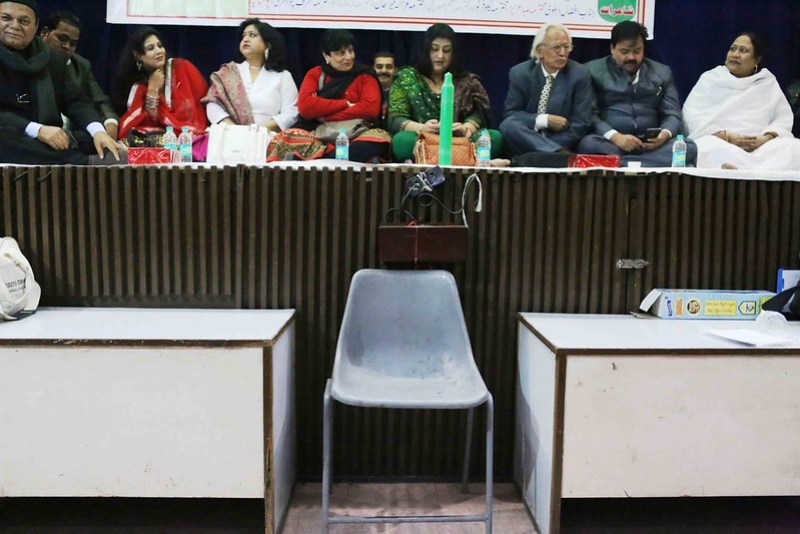
Photo Essay – Shakespeare’s World, Around Delhi

Living with the Bard.
[Text and photos by Mayank Austen Soofi]
Disclaimer: This article has stolen many phrases from the complete works of a writer who had a history of taking inspiration from people’s lives.
In Sufism, the death anniversary of a mystic is not mourned but celebrated, and the celebration is called Urs. Now, this “brave new world” is celebrating the 400th death anniversary of a man who was no Sufi, certainly, but one of the world’s greatest writers, whose very name today is a “tower of strength”.
William Shakespeare “passed through nature to eternity” in 1616, and since then his readers have been having “too much of a good thing”.
The world—which has been described overwhelmingly over these last four centuries by the words and phrases in Shakespeare’s 37 plays, 154 sonnets and five long poems—is marking the milestone through year-long festivities.
A Google search will take you to Shakespeare events planned across the globe. Especially check websites like www.shakespearesglobe.com/ 400, www.shakespeare400.org, www.shakespeareoxford2016.co. uk and www.shakespeare400chicago.com. The BBC will launch its Shakespeare Festival on 23 April—that’s the day the Bard “breathed his last”. In 2015, the British Council and the UK government’s Great Britain Campaign, which promotes tourism, announced “Shakespeare Lives”, a global programme to celebrate the writer’s influence on our lives, through films, exhibitions and plays, in 2016.
But, “for goodness sake”, you don’t really have to go to theatres, exhibitions and panel discussions to celebrate the dramatist. There’s no need even to watch the numerous Indian and foreign films adapted from his works.
“As good luck would have it,” you don’t have to read any Shakespeare either. All you have to do is look around your immediate world, and almost everywhere you will see his lines—in a solemn-looking cousin staring searchingly into the mirror (“To be, or not to be: that is the question”; Hamlet), in a flustered wife who has just returned home from shopping in the summer heat (“Shall I compare thee to a summer’s day?”; Sonnet 18), in an overtly generous friend (“heart of gold”; Henry V), in the grudging admiration for a horrible day-job colleague (“give the devil his due”; Henry IV), or even in a boss who is trying to make your life miserable at work (“The lady doth protest too much, methinks”; Hamlet).
To give you an idea, phrases as mundane as “All of a sudden”, “naked truth” and “fair play” entered daily-speak via Shakespeare—The Taming Of The Shrew, Love’s Labour’s Lost and The Tempest, respectively.
With snatches of Shakespeare’s prose having seeped into many aspects of our modern life, we end up meeting them daily. In 2015, for instance, the Hindustan Times carried a cricket story headlined “Method In Madness: SA Exploiting Indian Batsmen Run Between Wickets”. The first three words are from a line in Hamlet, a play that has given us so many commonplace expressions that an ignorant first-time reader might actually develop a low opinion of Shakespeare for shamelessly stealing our language.
For, much of Shakespeare has strayed far from his works. Too many of his lines have taken their own life, floating freely in the world, no longer attached to their original context. Over the years, these words have become the skeletal framework of our conversational language. They are our “household words”, so much so that whether we are tuned to Shakespeare or not, we end up living him day after day after day. And the situation will probably continue until the “crack of doom”.
In the end, it’s no “improbable fiction” to suggest that our man from England has left behind lines of such impact and immediacy that they will keep resonating powerfully with us.
Shakespeare will never “vanish into thin air”. The Delhi Walla tries to prove this through these photographs, taken across Delhi.
Will in the world
1. ‘All the world’s a stage’ (As You Like It): Participants at an Urdu poetry meet at the Ghalib Academy
2. ‘I’ll not budge an inch’ (The Taming Of The Shrew): An unusual passenger on a rickshaw outside Ramlila Maidan
3. ‘A dish fit for the gods’ (Julius Caesar): Altamash Nizami, a caretaker at Hazrat Nizamuddin Auliya’s Sufi shrine, surrounded by food served at Iftar during Ramzan
4. ‘… lend me your ears’ (Julius Caesar): A traditional ear cleaner at Connaught Place
5. ‘Sleep that knits up the ravell’d sleeve of care, the death of each day’s life, sore labour’s bath, balm of hurt minds….’ (Macbeth): A labourer sleeping on the road divider in Chawri Bazaar
6. ‘What’s in a name? That which we call a rose. By any other name would smell as sweet’ (Romeo And Juliet): Shahnawaz Khan, a flower seller outside Jama Masjid
7. ‘If music be the food of love, play on…’ (Twelfth Night): A musical session at Lodhi Gardens
8. ‘Doubt thou the stars are fire,. Doubt that the sun doth move,. Doubt truth to be a liar,. But never doubt I love’ (Hamlet): Stray dogs in Amar Colony
9. ‘But, soft! what light through yonder window breaks? It is the east, and Juliet is the sun’ (Romeo And Juliet): Morning sky as seen from Daryaganj
10. ‘If you prick us, do we not bleed?’ (The Merchant of Venice): The signboard of a Jewish Chabad House in Paharganj
11. ‘The future in the instant’ (Macbeth): Palm reader at Chandni Chowk
Shakespeare, always













Recent Comments